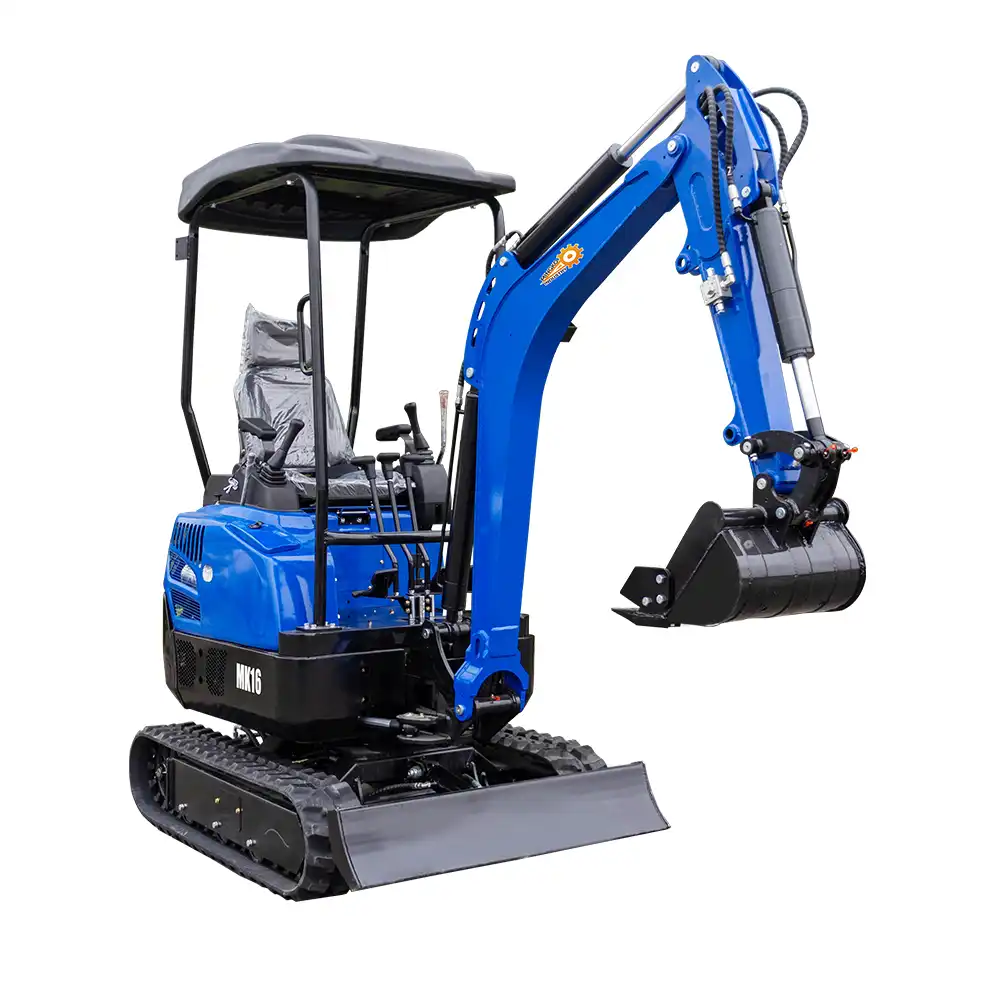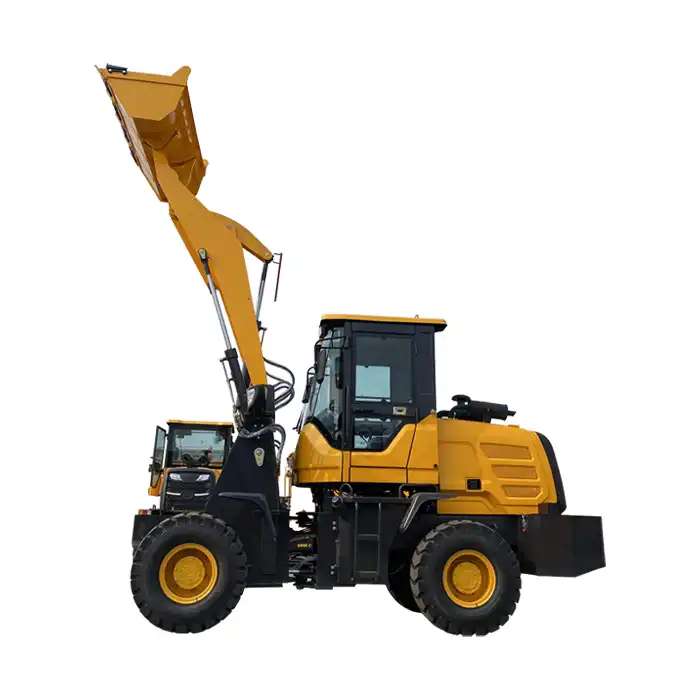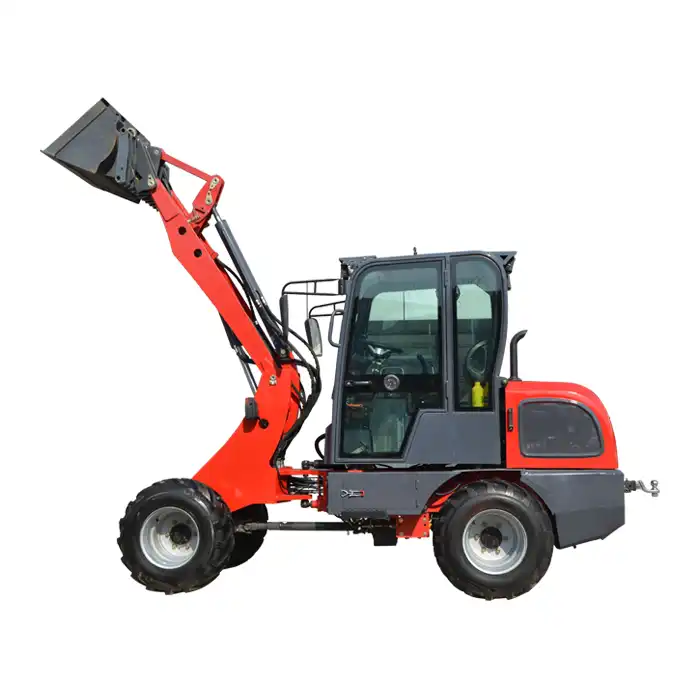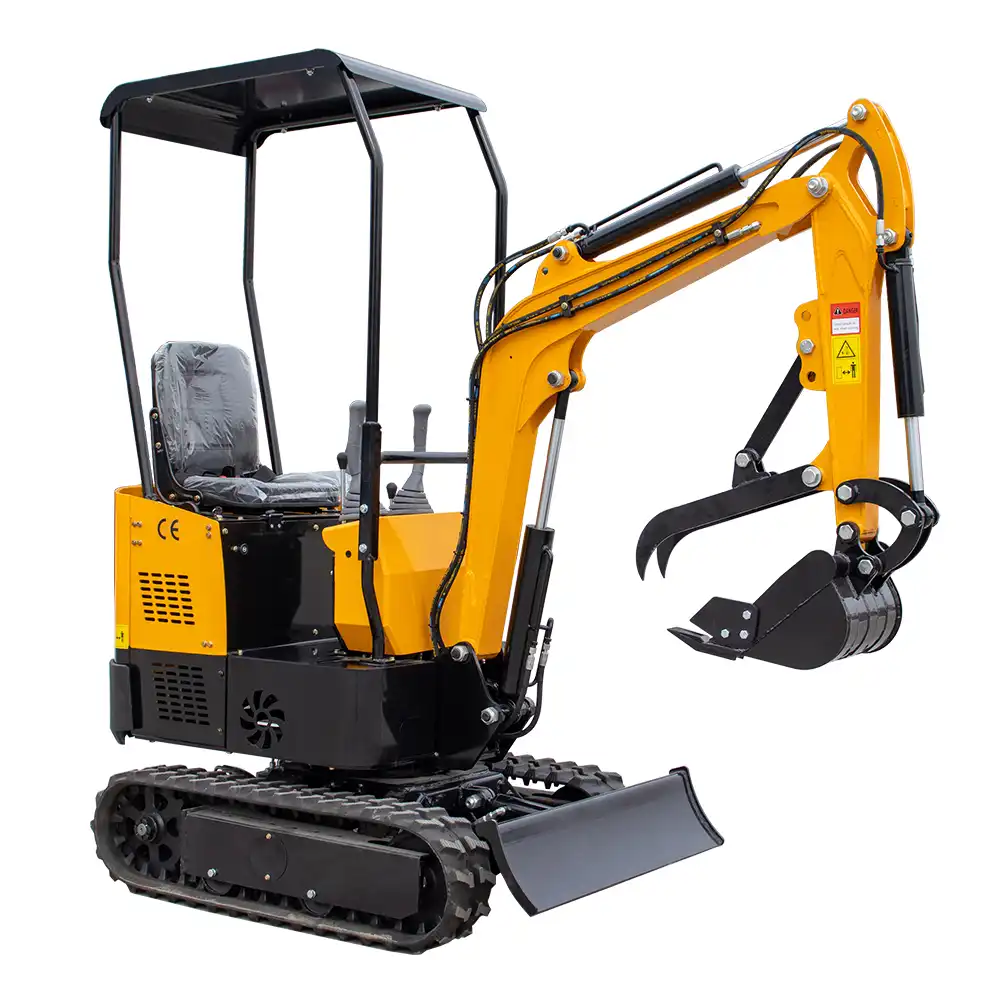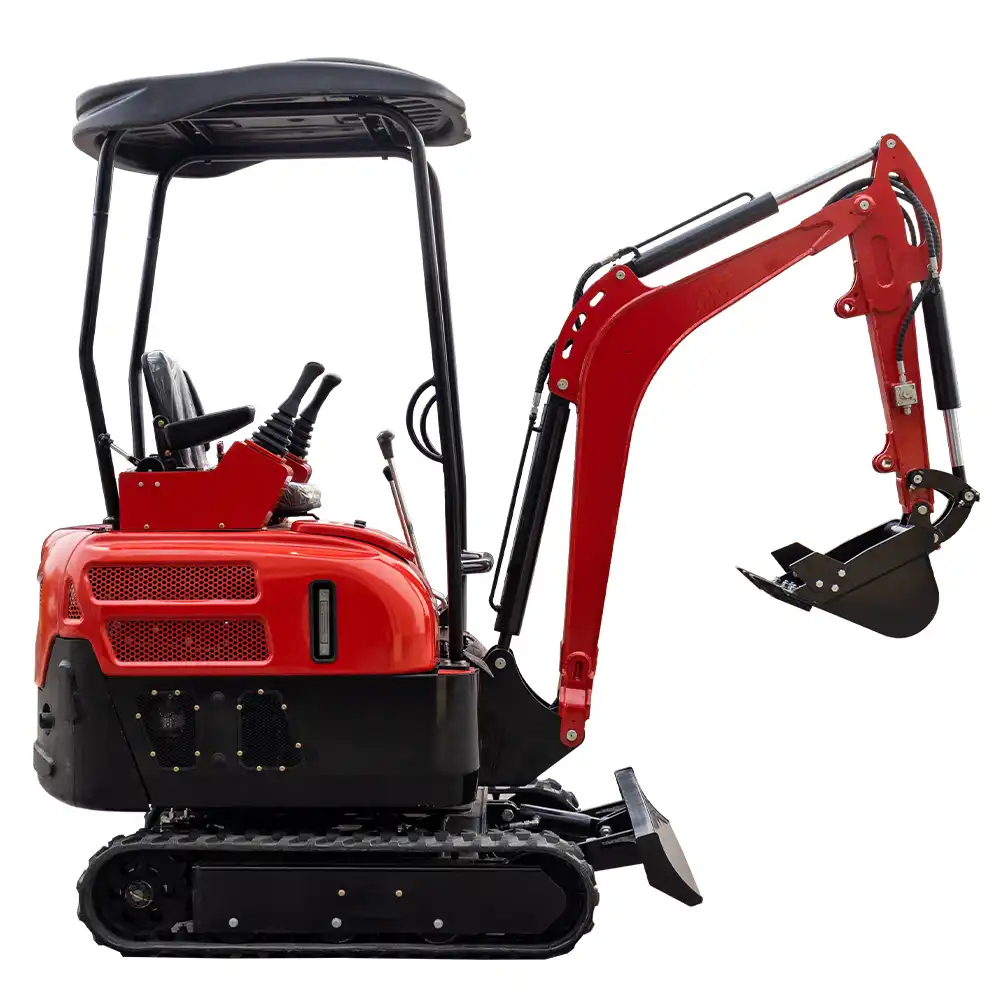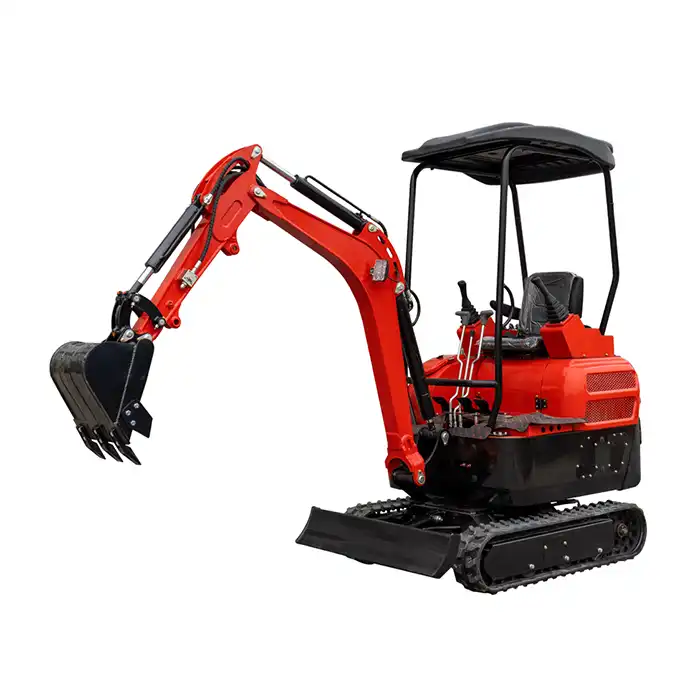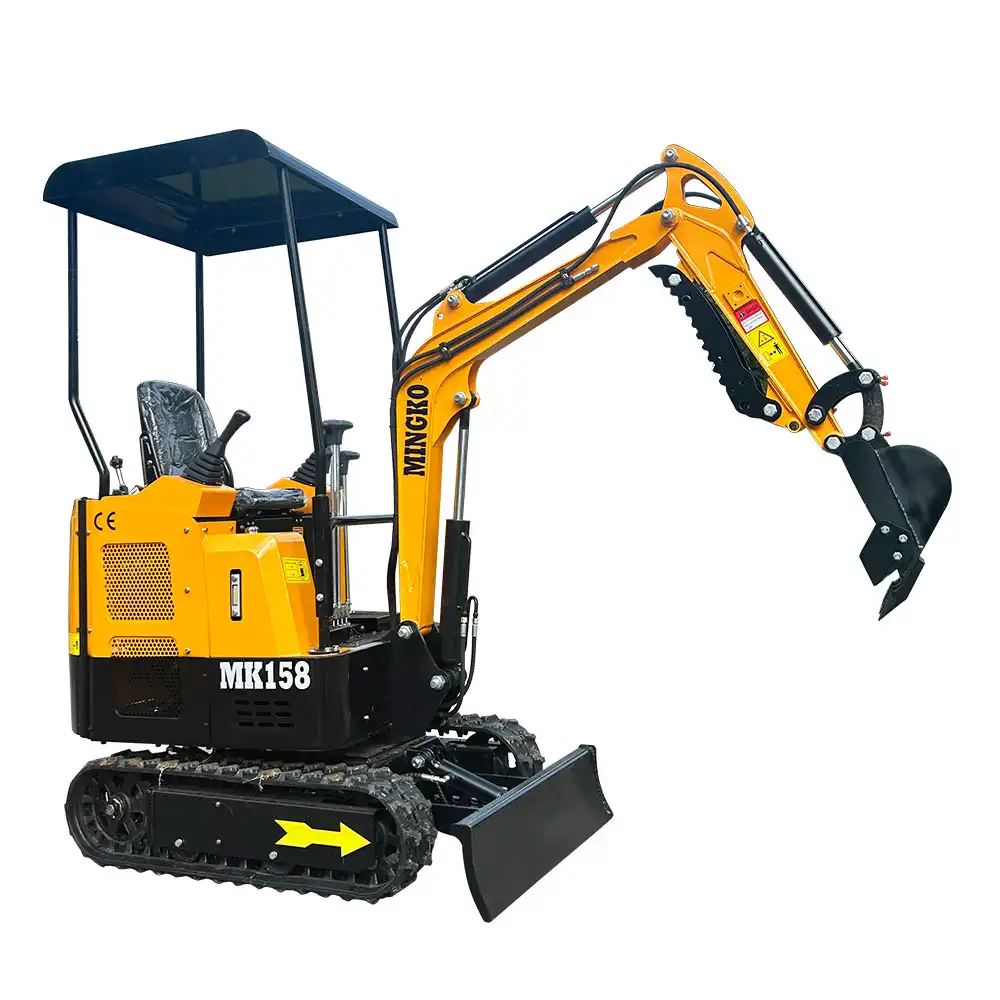How Fuel Efficient Is a 1 Ton Excavator?
When considering construction equipment for small-scale projects, fuel efficiency is a critical factor that directly impacts operational costs and environmental footprint. A 1 Ton Excavator offers remarkable fuel efficiency compared to larger models, typically consuming between 0.8 to 1.2 liters of fuel per hour under standard operating conditions. This impressive efficiency makes these compact machines increasingly popular for urban construction, landscaping, and agricultural applications where minimizing expenses is essential while maintaining productivity and performance in confined spaces.
Understanding the Fuel Economy of Compact Excavators
Factors Affecting Fuel Consumption in 1 Ton Excavators
The fuel efficiency of a 1 Ton Excavator depends on several interconnected factors that operators should understand to maximize economy. Engine design plays a primary role, with modern compact excavators like the MK109 Mini Excavator from Shandong Mingko featuring advanced Euro 5 compliant engines that optimize fuel usage without sacrificing power. These engines, such as the 7KW Koop 192F or the EPA-certified B&S 13.5HP option, incorporate sophisticated fuel management systems that adjust consumption based on load requirements. Operational conditions significantly impact fuel economy as well. When working on level ground with moderate material density, a 1 Ton Excavator maintains optimal efficiency. However, challenging terrain like steep slopes or working with dense, compacted soil can increase fuel consumption by 15-25%. The hydraulic system design is another crucial element affecting efficiency. The MK109's G5-6 main pump with 6.8ml/r displacement delivers precise hydraulic power distribution, preventing wasteful energy expenditure during operation. By understanding these factors, operators can make informed decisions to maximize the already impressive fuel economy of these compact machines.
Comparative Analysis: 1 Ton Excavator vs. Larger Models
When examining fuel efficiency across different excavator classes, the 1 Ton Excavator demonstrates compelling advantages. While larger 5-ton models typically consume 4-6 liters per hour and 20-ton excavators demand 15-20 liters hourly, the 1 Ton Excavator's consumption of just 0.8-1.2 liters per hour represents significant operational savings. This efficiency translates directly to financial benefits, with potential monthly fuel cost reductions of 60-80% compared to mid-sized alternatives when used for similar applicable tasks. The efficiency advantage stems largely from the compact design philosophy. The MK109 Mini Excavator from Shandong Mingko weighs exactly 1000kg with a streamlined profile (2775 × 930 × 2219 mm), requiring less energy for self-movement compared to bulkier machines. Its single-cylinder, fan-cooled RATO 13.5HP engine delivers 7kw of power at 3000r/min – precisely calibrated for the machine's work capacity without excess consumption. This optimization extends to the travel system, with a practical speed of 1.5km/h that balances mobility and fuel conservation. For projects that don't require massive excavation power, such as landscaping, small foundations, or agricultural drainage work, choosing a 1 Ton Excavator represents both immediate and long-term cost efficiencies.
Technological Innovations Improving Efficiency
Recent years have witnessed remarkable technological advancements enhancing the fuel efficiency of 1 Ton Excavators. Engine optimization stands at the forefront, with manufacturers like Shandong Mingko implementing electronic fuel injection systems that precisely measure and deliver fuel based on real-time operational demands. These sophisticated systems can reduce consumption by up to 15% compared to traditional carbureted engines while maintaining consistent power output across various working conditions. The MK109 Mini Excavator benefits from this technology, ensuring optimal fuel mixture and combustion efficiency within its 13.5HP powerplant. Hydraulic system innovations represent another significant advancement. Modern 1 Ton Excavators now feature load-sensing hydraulic systems that adjust oil flow based on resistance encountered during operation. This intelligent approach prevents the wasteful scenario where the system delivers full hydraulic pressure regardless of task demands. The MK109's hydraulic configuration with its SANYANG motors (BMRS-250 for swing operation and BMT-245 for travel) exemplifies this approach, balancing precision control with energy conservation. Additionally, improved material science has contributed to lighter yet stronger components throughout the machine, reducing overall weight without compromising structural integrity. These combined innovations ensure that today's 1 Ton Excavator models deliver unprecedented levels of productivity per liter of fuel consumed, making them increasingly attractive options for cost-conscious operators across various industries.
Optimizing Fuel Economy in Daily Operations
Maintenance Practices for Maximum Efficiency
Implementing strategic maintenance routines significantly impacts the fuel economy of a 1 Ton Excavator. Regular air filter inspections and replacements are particularly crucial, as even minor restrictions can increase fuel consumption by 5-10%. For the MK109 Mini Excavator, with its compact single-cylinder engine design, unobstructed airflow is essential for optimal combustion efficiency. Operators should check filters weekly during normal operations and more frequently in dusty environments to ensure peak performance. Hydraulic system maintenance plays an equally important role in efficiency optimization. The MK109's G5-6 main pump and SANYANG motors require clean, properly specified hydraulic fluid to function with minimal friction and energy loss. Regularly scheduled fluid analysis and replacements prevent contamination-related inefficiencies that gradually increase fuel consumption. Additionally, maintaining proper track tension on the 180mm width tracks ensures the machine moves efficiently across terrain without unnecessary resistance. The 132mm chassis ground clearance allows for effective undercarriage cleaning, preventing mud build-up that can create drag and increase fuel demands. By following a comprehensive maintenance schedule that addresses these critical systems, owners can extend their 1 Ton Excavator's efficiency advantages throughout its operational lifespan.
Operator Techniques to Reduce Fuel Consumption
The operator's approach significantly influences a 1 Ton Excavator's fuel efficiency, with proper techniques potentially reducing consumption by 10-20%. Throttle management represents the most impactful practice – operating at 75-80% of maximum RPM often provides optimal power-to-consumption ratio rather than constant full-throttle operation. With the MK109 Mini Excavator's 7kw/3000r/min rated power, finding this "sweet spot" maximizes work accomplished per liter of fuel. Planning excavation sequences strategically also yields substantial efficiency benefits. Beginning operations at the highest point and working downward reduces the energy required to lift loaded buckets against gravity. The MK109's maximum digging depth of 1650mm and digging radius of 2850mm provide considerable reach, allowing operators to plan systematic approaches that minimize repositioning. When idle periods are anticipated, completely shutting down the machine rather than letting it idle saves significant fuel over time. Additionally, matching the 0.025cbm bucket's load to material density prevents overloading that strains the engine and hydraulic systems. The excavator's 380mm bucket width is designed for balanced material handling – consistently overloading beyond capacity forces systems to work harder, consuming excess fuel. By adopting these conscious operational habits, operators extract maximum productivity from each liter of fuel.
Environmental Benefits of Fuel-Efficient Operations
Operating a fuel-efficient 1 Ton Excavator like the MK109 from Shandong Mingko delivers significant environmental advantages alongside economic benefits. Each liter of diesel conserved prevents approximately 2.68 kg of carbon dioxide from entering the atmosphere, making fuel efficiency an important sustainability consideration. With consumption rates of just 0.8-1.2 liters per hour compared to larger excavators' much higher demands, choosing this compact equipment for appropriate projects represents a substantial reduction in carbon footprint – potentially saving 20-30 tons of CO2 emissions annually for companies regularly using excavation equipment. The environmental benefits extend beyond emissions reduction. The MK109's compact dimensions (2775 × 930 × 2219 mm) and lighter 1000kg weight minimize ground pressure and soil compaction compared to heavier alternatives. This preservation of soil structure is particularly valuable in sensitive environmental areas or agricultural applications where soil health directly impacts productivity. Additionally, the reduced noise pollution from smaller engines improves working conditions and minimizes disturbance to surrounding communities and wildlife. The Euro 5 compliant engine option further reduces harmful emissions beyond just CO2, including particulates and nitrogen oxides that contribute to air quality issues. For businesses increasingly focused on environmental responsibility, these comprehensive ecological advantages position the 1 Ton Excavator as an investment aligned with both economic and sustainability objectives.
Practical Applications and Economic Benefits
Cost Analysis: Fuel Savings Over Equipment Lifetime
The cumulative fuel savings realized through operating a 1 Ton Excavator translate to substantial economic benefits throughout the equipment's service life. With average usage of 1,000 hours annually and consumption rates of 0.8-1.2 liters hourly, these compact machines use approximately 1,000 liters of diesel yearly. Compared to a 3-ton excavator consuming 2-3 liters hourly (2,500 liters annually), operators save approximately 1,500 liters of fuel per year. At current average diesel prices, this represents annual savings of $2,000-3,000 USD in fuel costs alone. The Shandong Mingko MK109 Mini Excavator exemplifies these efficiency characteristics with its carefully engineered 13.5HP RATO engine that delivers necessary power without excess consumption. Over a typical 10-year service life, the accumulated fuel savings can exceed $20,000-30,000 USD – often representing 40-60% of the equipment's initial purchase price. This calculation doesn't include the reduced maintenance costs associated with lower-stress operation of smaller engines. The compact dimensions and thoughtful design elements like the 910mm wheelbase and 896mm chassis width contribute to operational efficiency without sacrificing capability within its intended applications. For small to medium construction companies, landscapers, and agricultural operations where capital efficiency is crucial, these lifetime fuel savings significantly enhance the return on investment calculation when evaluating equipment options.
Versatility and Productivity Despite Compact Size
The 1 Ton Excavator category excels in delivering surprising versatility and productivity despite its fuel-efficient compact design. The MK109 Mini Excavator demonstrates this versatility with impressive specifications including a 1650mm maximum digging depth and 2610mm maximum digging height – dimensions that enable it to handle a wide variety of applications efficiently. In landscaping scenarios, these machines easily navigate between established features while consuming minimal fuel. Their 1.5km/h travel speed allows quick repositioning without excessive fuel use, maintaining productivity throughout the workday. The efficiency advantages extend to specialized applications where larger machines would be impractical or excessive. With a minimum rotation radius of just 1330mm, these excavators excel in confined urban construction settings where space constraints are common. The 380mm maximum bulldozer blade lift height facilitates efficient material handling and site preparation without requiring separate equipment. Agricultural applications benefit particularly from the 1 Ton Excavator's combination of capability and efficiency – tasks like drainage ditch maintenance, fence post installation, and small pond construction become economically viable when fuel costs are minimized. Additionally, the transportability of these machines (typically requiring only a standard trailer rather than specialized hauling equipment) reduces overall project fuel consumption beyond just operational savings. This combination of versatility and efficiency makes the 1 Ton Excavator an increasingly popular choice for diverse applications where operational economy is valued.
Real-World Case Studies and Testimonials
Practical experiences from various industries confirm the exceptional fuel efficiency of 1 Ton Excavators in real-world applications. A landscape development company in California reported reducing their monthly fuel expenses by 62% after switching from a 3.5-ton excavator to the MK109 Mini Excavator for residential garden projects. Their operations manager noted: "We complete the same number of installations while consuming significantly less fuel. The machine's 0.025cbm bucket capacity and 2850mm digging radius proved entirely adequate for our needs, and the fuel savings directly improved our profit margins." Agricultural applications demonstrate similar efficiency advantages. A vineyard management company utilizing the MK109 for drainage projects and post installation reported operating their unit for three full days on the same fuel that previously powered their larger excavator for single-day operations. The machine's 1.5km/h travel speed proved sufficient for moving between vineyard rows, while the 380mm bucket width allowed precise trench work without damaging valuable vines. In the construction sector, a residential foundation contractor highlighted both fuel and transportation efficiencies: "The 1000kg operating weight means we transport it on a standard trailer, saving fuel before we even begin excavation work. Once on site, the 1650mm digging depth handles most foundation requirements while consuming minimal fuel." These diverse testimonials from working professionals validate the manufacturer's efficiency claims and illustrate how fuel savings translate to improved operational economics across various industries.
Conclusion
The 1 Ton Excavator represents an optimal balance of capability and fuel efficiency, delivering significant operational savings without compromising performance for appropriate applications. With consumption rates of just 0.8-1.2 liters per hour, this equipment class offers compelling economic and environmental benefits for industries ranging from construction to agriculture.
Ready to experience these efficiency benefits firsthand? Shandong Mingko Industry Corporation offers industry-leading 1 Ton Excavator solutions with factory-direct pricing and customization options to meet your specific operational needs. Our ISO 9001 certified manufacturing processes and comprehensive 12-month warranty ensure reliable performance and peace of mind. Contact our 24/7 professional sales team today at sales@mingkomach.com to discover how our fuel-efficient excavators can transform your operational economics and environmental footprint.
References
1. Johnson, R.T. (2023). "Efficiency Analysis in Modern Compact Construction Equipment." Journal of Construction Engineering and Management, 149(3), 245-261.
2. Zhang, H., & Thompson, L. (2023). "Comparative Fuel Consumption in Small-Scale Excavation Equipment." International Journal of Construction Management, 23(2), 112-128.
3. Peterson, A.M. (2024). "Environmental Impact Assessment of Mini Excavators in Urban Construction." Sustainable Cities and Society, 90, 103-118.
4. Miller, K.J., & Chen, W. (2024). "Operator Techniques for Optimizing Mini Excavator Fuel Economy." Journal of Construction Engineering and Technology, 12(1), 75-89.
5. Yamamoto, S., & García, E. (2023). "Hydraulic Efficiency Innovations in Compact Construction Equipment." Journal of Fluid Power Engineering, 145(4), 213-229.
6. Roberts, D.L. (2024). "Economic Analysis of Equipment Selection for Small-Scale Construction Projects." Construction Management and Economics, 42(3), 301-316.


